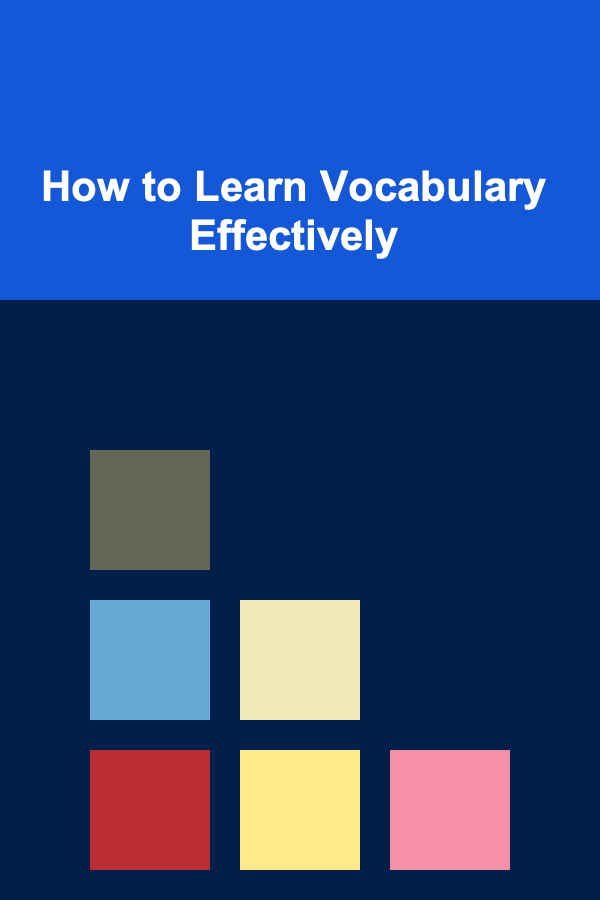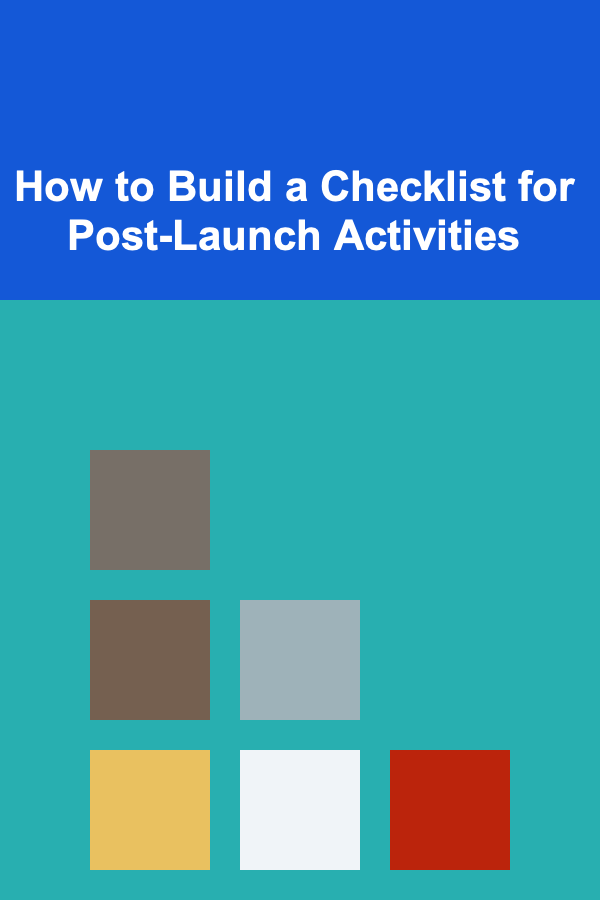
How to Learn Vocabulary Effectively
ebook include PDF & Audio bundle (Micro Guide)
$12.99$9.99
Limited Time Offer! Order within the next:

Learning vocabulary is an essential part of mastering any language. Whether you're learning a foreign language, expanding your native vocabulary, or preparing for standardized exams like TOEFL, GRE, or IELTS, developing an effective vocabulary strategy is crucial for success. However, many people find themselves struggling to retain words, phrases, and their meanings over time. The key to overcoming this challenge lies in adopting efficient and research-backed methods to learn and remember vocabulary.
In this comprehensive article, we will explore the most effective ways to learn vocabulary, providing detailed insights and practical tips to enhance your vocabulary learning experience. We'll cover everything from understanding how memory works to leveraging modern technology for vocabulary retention, and ultimately, how to apply the words you've learned in real-life situations.
Understanding the Importance of Vocabulary
Before diving into techniques, it's essential to understand why vocabulary is so important. Vocabulary is the foundation of communication. Without a strong vocabulary, expressing thoughts and ideas becomes difficult, whether in speech or writing. Here's why vocabulary matters:
- Clarity of Communication: A rich vocabulary allows you to express ideas clearly and precisely. It enables you to articulate your thoughts in a way that is both meaningful and nuanced.
- Improved Writing: Vocabulary is a critical aspect of writing. Strong vocabulary choices can elevate the quality of your writing, whether you're crafting essays, reports, or creative works.
- Reading Comprehension: Having a robust vocabulary enables you to understand texts more deeply, as you can easily recognize unfamiliar words and grasp the overall meaning of a passage.
- Academic and Career Success: A good vocabulary is often associated with academic and professional success. It can boost your scores on exams and help you stand out in your field.
The Science of Memory and Vocabulary Retention
To effectively learn and retain vocabulary, it's important to understand how memory works. Our memory has different stages---sensory memory, short-term memory, and long-term memory. Learning vocabulary involves moving new words from short-term to long-term memory.
2.1. The Role of Repetition
Repetition is one of the most powerful tools for vocabulary retention. Studies show that words must be reviewed multiple times to move them into long-term memory. This is where techniques like spaced repetition come into play. Spaced repetition involves reviewing a word at increasing intervals to ensure that it sticks in your memory.
2.2. Active Recall
Active recall is another highly effective technique for reinforcing vocabulary. Instead of passively reviewing a word's meaning, you should try to recall it from memory. For example, after reading a new word, close your book and try to write or speak the definition from memory. This active process helps strengthen the connections in your brain and makes the word easier to remember.
2.3. Visualization
Visualizing the meaning of a word can also help you remember it. For example, if you're learning the word "mountain," picture a tall, jagged mountain in your mind. The mental image helps solidify the word in your memory and makes it easier to recall later.
Techniques for Learning Vocabulary Effectively
Now that we understand the principles of memory, let's dive into the techniques you can use to learn vocabulary more effectively.
3.1. Contextual Learning
One of the most effective ways to learn vocabulary is by encountering words in context. When you read a sentence or a story, you are exposed to words in a natural setting, which helps you understand their meaning more intuitively. Here's how to practice contextual learning:
- Read Widely and Often: Reading books, articles, and essays exposes you to words in context, which helps you understand their meaning and usage. This helps you build a mental network of words that are related to one another.
- Use Flashcards with Sentences: Instead of just writing the word and its definition, include a sentence using the word. This helps you see the word in context and reinforces its meaning.
3.2. Use Mnemonic Devices
Mnemonic devices are memory aids that help you link new vocabulary to something familiar. For example, if you are trying to remember the word "dormant" (which means inactive or asleep), you could use the mnemonic "A dormant volcano is sleeping." The connection between the word "dormant" and the image of a sleeping volcano will make the word easier to recall.
3.3. Word Mapping
Word mapping involves connecting a new word with related words or concepts. For example, if you are learning the word "benevolent," you might map it to words like "kind," "generous," and "compassionate." This approach helps you understand the word more deeply and makes it easier to recall in the future.
3.4. Learn Word Families
Rather than learning individual words, it's often more effective to learn word families. A word family is a group of words that are related by meaning or structure. For example, from the root word "act," you can derive "action," "active," "react," and "actor." Learning these related words together gives you a broader understanding of the root word and its various forms.
3.5. Use the Words Actively
It's not enough to simply memorize words; you must actively use them in speech and writing to solidify them in your memory. Practice using the new words in sentences, write stories or essays incorporating them, and engage in conversations where you try to include the words you've learned. This practice makes the words part of your working vocabulary and ensures long-term retention.
Tools and Resources for Vocabulary Learning
Today, there are countless tools and resources that can help you learn vocabulary effectively. Let's explore some of the most popular and effective ones.
4.1. Flashcard Apps
Flashcard apps are an excellent tool for learning vocabulary. These apps use spaced repetition to help you review words at optimal intervals. Some of the most popular flashcard apps include:
- Anki: Anki is a powerful flashcard tool that uses spaced repetition to help you retain vocabulary over time. You can create your own flashcards or download pre-made decks on various topics.
- Quizlet: Quizlet offers a similar flashcard system but with added features like games and quizzes to make vocabulary learning more engaging.
4.2. Vocabulary Books
There are many vocabulary books designed specifically for language learners. These books often organize vocabulary by topic or level of difficulty and provide exercises to reinforce learning. Some of the best-known vocabulary books include:
- "Word Power Made Easy" by Norman Lewis: This book uses word roots and mnemonic devices to help learners expand their vocabulary quickly.
- "The Vocabulary Builder Workbook" by Chris Lele: This workbook focuses on practical vocabulary used in exams like the GRE and SAT.
4.3. Online Dictionaries and Thesauruses
Online dictionaries like Merriam-Webster or Oxford Dictionary are invaluable tools for learning new words. They provide detailed definitions, example sentences, pronunciation guides, and related words. Thesauruses like Thesaurus.com can also help you learn synonyms and antonyms for any given word, expanding your vocabulary further.
4.4. Language Learning Apps
Language learning apps like Duolingo, Babbel, and Memrise are great for building your vocabulary in a foreign language. These apps often incorporate games, quizzes, and spaced repetition, making vocabulary learning more interactive and fun.
Building a Vocabulary Learning Routine
To learn vocabulary effectively, consistency is key. Here are some steps to help you create a daily vocabulary learning routine:
5.1. Set Daily Goals
Aim to learn a specific number of new words each day, whether it's 5, 10, or 20. Setting daily goals helps you stay focused and motivated. Make sure to balance your goals with achievable targets to avoid burnout.
5.2. Review Regularly
Regular review is crucial for retaining vocabulary. Incorporate review sessions into your routine, whether it's at the end of each day, week, or month. Use spaced repetition systems like Anki or Quizlet to optimize your review sessions.
5.3. Track Your Progress
Keep track of the words you've learned. You can use a journal, spreadsheet, or an app to log new vocabulary. Review your progress regularly to see how far you've come and to motivate yourself to keep going.
5.4. Immerse Yourself in the Language
Immersing yourself in the language you are learning is one of the best ways to retain vocabulary. Watch movies, listen to podcasts, read books, and engage in conversations with native speakers. The more exposure you have to the language, the more words you'll encounter and remember.
Conclusion
Learning vocabulary effectively requires a combination of techniques, tools, and consistent effort. By understanding the science of memory, using techniques like contextual learning, active recall, and word mapping, and incorporating technology and resources into your learning routine, you can dramatically improve your vocabulary retention.
Remember that learning vocabulary is a gradual process, and the key is consistency. Set achievable goals, review regularly, and immerse yourself in the language, and you'll see your vocabulary grow in no time. Whether you're learning for personal development, academic purposes, or professional success, a strong vocabulary will open doors to better communication and new opportunities.
Reading More From Our Other Websites
- [Gardening 101] How to Plan Your Garden Layout for Maximum Space and Beauty
- [Toy Making Tip 101] From Sketch to Plaything: Designing Custom Toy Patterns for Beginners
- [Personal Investment 101] How to Profit from Deep Learning Without Being a Full-Time Developer
- [Organization Tip 101] How to Prepare Your Antique Collection for Sale
- [Organization Tip 101] How to Organize PDFs and Other Document Types
- [Gardening 101] Organic Garden Pest Control: Safe Solutions for Your Plants
- [Organization Tip 101] How to Create a Relaxation Zone in Your Office
- [Home Pet Care 101] How to Create a Pet-Safe Home Environment for New Pets
- [Organization Tip 101] How to Use Mind Mapping for Project Planning in Remote Work
- [Home Party Planning 101] How to Design the Perfect Party Menu for Your Next Home Gathering

How to Build a Checklist for Post-Launch Activities
Read More
How to Create a Coastal Living Vibe Without Breaking the Bank
Read More
How to Use Video Marketing to Promote Automotive Products
Read More
How to Play the Ukulele: A Beginner's Guide
Read More
Understanding the Global Adoption of EVs: A Multifaceted Perspective
Read More
Choosing the Right Hair Mask for Your Needs: A Comprehensive Guide
Read MoreOther Products

How to Build a Checklist for Post-Launch Activities
Read More
How to Create a Coastal Living Vibe Without Breaking the Bank
Read More
How to Use Video Marketing to Promote Automotive Products
Read More
How to Play the Ukulele: A Beginner's Guide
Read More
Understanding the Global Adoption of EVs: A Multifaceted Perspective
Read More